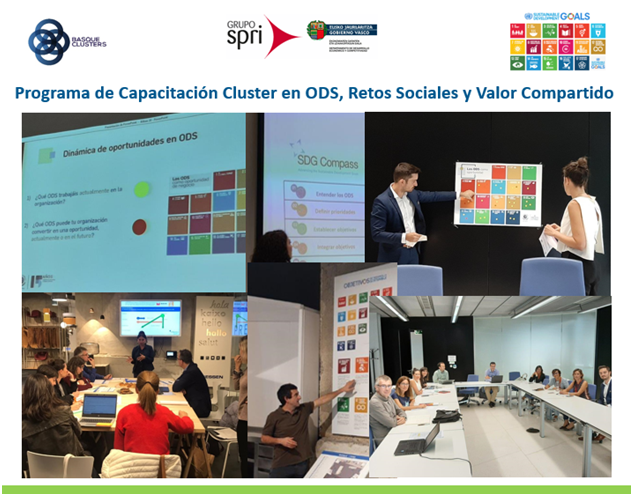Capacity Building Programme for Basque Clusters on SDGs, Creating Shared Value and Addressing Societal Challenges
Over the last three months, SPRI has organized a pilot capacity building initiative for the Basque Clusters on “SDGs, Societal Challenges and Shared Value creation”. SPRI designed this training in the framework of the working group on Shared Value the agency launched in 2017 with 8 clusters.
For this training, SPRI partnered with UN Global Compact- Red Española, who has delivered 3 half-day training sessions and also 3 facilitation sessions conducted by ORKESTRA were scheduled. 8 cluster managers and senior officers from ACLIMA Basque Environmental Cluster, Cluster de Energía, Clúster del Papel, ERAIKUNE, GAIA, HABIC and SIDEREX attended the programme.
Objective - Why this capacity building initiative on SDGs?
Early 2016 the Basque Government pioneered the SDG journey releasing the Basque Country Agenda 2030, to be deployed with the contribution from all government departments and agencies.
On the other hand, the European Commission has also highlighted as priorities for its research & innovation funding programmes, key societal challenges in the fields of health, demographic change and wellbeing; Food security, sustainable agriculture and forestry, marine and maritime and inland water research, and the bioeconomy; Secure, clean and efficient energy; Smart, green and integrated transport; Climate action, environment, resource efficiency and raw materials. And, more recently, in Mission Oriented R&D in the EU report, Prof. Mariana Mazzucato also points out to the “big societal problems” to be solved.
It is all about addressing global challenges that generate business and growth opportunities but require R&D&I capacities and ambitious partnerships beyond individual actors.
Why a Cluster approach to SDGs?
Unlike MDGs, SGDs involve a holistic approach to actors to solve the set challenges; it is not just states or governments, but they also call on civil society and rely on the innovative and entrepreneurial drive of the business sector. Furthermore, it is the magnitude of the ambitious and pressing environmental, social and economic goals to be achieved, that require unprecedented engagement of multiple economic, technology and government agents.
In this context, Cluster Management Organisations (CMOs), built on TRUST and commitment with innovation and competitiveness, that optimally embody triple helix cooperation, appear as key agents of change in this mission too, facilitating collective action of business and industry, notably SMEs, with the science technology and innovation sector to address SDGs creating shared value.
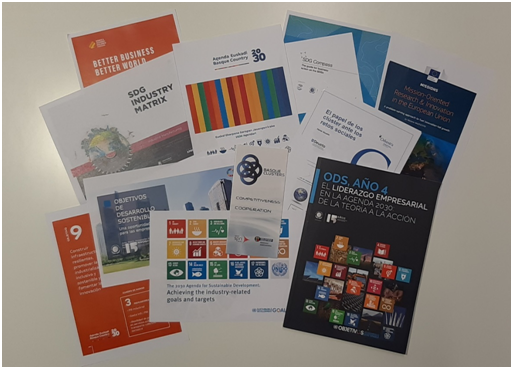
Programme and contents
SESSION 1. Introduction to SDG
Session 1 introduced Sustainable Development Goals (SDG) and 2030 Agenda; the role of business and industry, and SDG-related business opportunities: participants were presented with the social dimension goals (SDG 1, 2, 3, 4, 5 and 16), environmental dimension goals (SDG 6, 7, 11, 13, 14 and 15) and economic dimension goals (SDG 8, 9, 10, 12 and 17), focusing on specific targets for the private sector.
The role of the different actors in Agenda 2030 was also covered: Administration, Civil society and the Business sector (in terms of building business strategies aligned to SDGs; innovating with products and services that contribute to SDG and measuring and reporting on SDG achievement).
Potential SDG Business opportunities were explained as well: access to new markets; employees with a purpose; attract responsible customers and clients; doing business with large companies; opportunities with the public sector and adapt and anticipate to regulations.
In the end, tips to be a leading company in 2030 Agenda were offered: joining UN Global Compact; engaging Top level leadership; integrating SDGs into the organisation DNA; setting quantifiable commitments aligned with 2030 Agenda; Innovating towards new business opportunities and establishing new partnerships with other agents.)
This session ended with a group dynamics on current and potential SDG opportunities.
SESSION 2. SDG-based Business Management
Session 2 addressed “SDG-based Business Management”. Participants were introduced to SDG Compass Methodology, a guide for business action on the SDGs in 5 practical steps:
- Understanding the SDG: the opportunities and responsibilities they represent to the company, and how business practices, investments and solutions and products developed contribute.
- Defining Priorities: mapping the value chain to identify positive and negative impact areas. Publicly committing with the achievement of the prioritised SDG.
- Setting goals: defining the SDG scope and selecting KPIs
- Integrating SDG: into the governance and core business of the company, embedded across all functions and departments and into relevant partnerships.
- Reporting and communication: Reporting SDG performance within the set of priorities shared with stakeholders.
A group dynamic on SDG Awareness and Action Plan (Risks/Opportunities; Actions; Measures, Commitments and strategic partnerships) was also carried out, exploring how to establish public commitments according to 2030 Agenda.
It is expected that achieving SDG could open up US$ 12 trillion of market opportunities by 2030.
SESSION 3. Reporting and focus on 2 SDG examples
Finally, Session 3 focused on Reporting as a Strategic Tool that: 1) Supports sustainable decision making, 2) Drives innovation, 3) Informs business strategy, 4) Engages stakeholders and generates trust, attracting partners and investors through transparency and accountability.
Participants went over the Steps to integrate SDG reporting (with some real examples from both industrial and services companies): 1) Define priorities (SDG, Targets, report contents), 2) Measure and analyse (identify actions, products, services, that contribute to more than 1 SDG and are achieved with the least impact; select quantitative and qualitative indicators); 3) Report, implement and integrate changes.
Lastly, participants received a deeper insight into two SDG examples: SDG 9 and SDG 13. Regarding SDG 13 Climate change, it is generally the most widely prioritised SDG (together with SDG 12 and SDG 8) and one of the most transversal ones. It implies transition to a new production and consumption model where new Business opportunities around SDG13 arise in areas like: Smart and sustainable mobility, digitalisation, green building and rehabilitation, energy efficiency, decarbonisation or sustainable food production.
As for SDG 9 Industry, Innovation and Infrastructure, together with SDG 08, SDG 10, SDG 11, SDG12 and SDG16, it is the Economic Dimension of sustainable development goals.
As a curiosity, SDG 9 Industry, Innovation and Infrastructure is the 3rd most prioritised by organisations in the Basque Country (as compared to 9th in Spain and also 9th globally). SDG 9 targets include: access to technology, boost innovation, and in industrial transformation, inclusive and sustainable industrialization, universal ICT access, increase financial markets and services, and resilient and sustainable infrastructures. SDG 9 addresses some of the main challenges linked to the 4th industrial revolution (new competences and continuous learning; digitalization&innovation; work automation and robotisation, climate change fight or cybersecurity…)
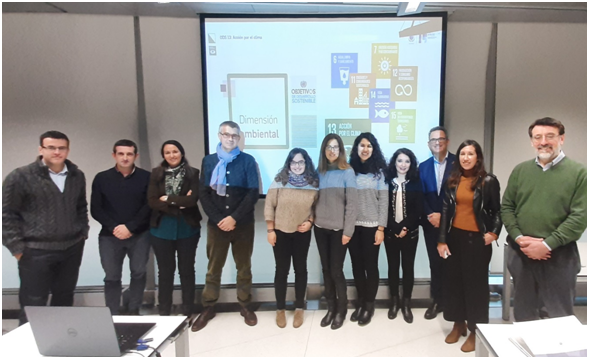
Facilitation Sessions
Interspersed with these 3 training sessions delivered by UN Global Compact- Spanish Network, the organizer scheduled 3 facilitation sessions, conducted with ORKESTRA, in order to advance towards a community of practice from the Inter-cluster Working Group on SDG and Creating “Shared Value”, that SPRI launched in 2016, based on that conceptual framework developed by Prof. Michael Porter and Mark Kramer.
In the first session, the notion of CSV ecosystems was further explored, distinguishing between philanthropy, CSR and CSV which is related to expanding business opportunities by covering at the same time social needs, with a scalable impact.
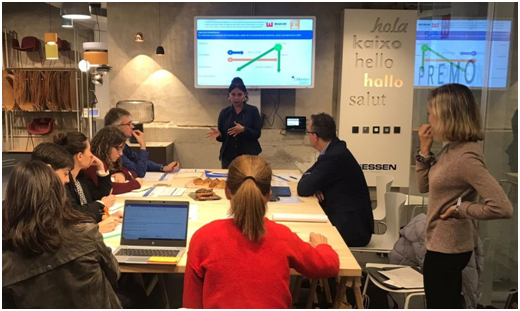
The second one was devoted to build a cluster Roadmap for a CSV Proposal (identifying strengths and weaknesses, social value and economic value, stakeholders and beneficiaries, partners and next steps); all participants elaborated their draft proposal and we discussed.
The last facilitation session was aimed at sharing all participants’ proposals for Cluster CSV Roadmaps and discussing the role of cluster organisations as engines, because of their background in collaborative work, allowing for an innovative approach in collective action answering to social challenges, and for potential opportunities arising from their complementarities in developing sustainable solutions and business strategies with greater impact in the community.
Some learnings and take-outs to share
- “Prioritizing your SDG targets does not imply that certain SDGs are more important than others. Rather, it recognizes that your company can have particularly significant impacts on certain SDGs”.
- Focusing on the SDGs at “Target” and KPI level is more meaningful since its granularity allows for better pinpointing of critical impact areas.
- 2 entry points for identifying priority SDG targets: assessing risks to people and the environment and exploring opportunities for beneficial products, services and investments.
- SDGs must be localized, “landed” and translated or adapted adequately to the industrial and business sector, in particular to the reality of each SME.
- Bear in mind the interconnected nature of SDGs and their targets: actions can contribute in more than one target or SDG.
Cluster management organisations can have a pivotal role in achieving SDGs:
- Raising awareness and engagement among their stakeholders and membership, in particular SMEs.
- Identifying common challenges and opportunities.
- Promoting exchanges of experiences with the most advanced in SDGs.
- Launching collaborative projects that contribute to specific SDG targets.
- Engaging in cross-cluster collaboration with Mission driven approach.
- …
It is inspiring to see that Basque Clusters are already piloting different initiatives to further advance in 2030 Agenda: disseminating and awareness raising among members; integrating SDGs in the Cluster organisations’Strategy Plan and Balanced Scorecard; developing SDG performance diagnostics and online self-assessment tools; linking their large companies and their SMEs members to share and learn from the most advanced ones; conducting disseminating and training workshops; setting up SDGs working groups and specific taskforces for collective action in projects related to smart society, circular economy, passive housing, last mile sustainable logistics, etc. Or even developing gamification and serious games for facilitating circular business models and value chains.
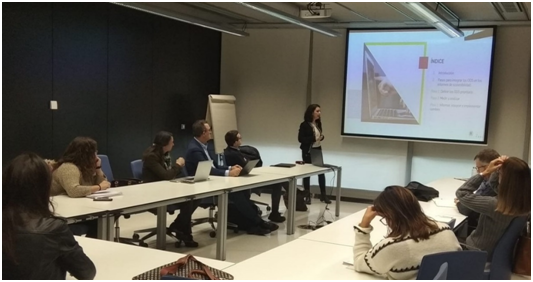
David Fernández Terreros, Clusters Coordination and Research, SPRI Basque Business Development Agency ( dfernandez [at] spri.eus )
